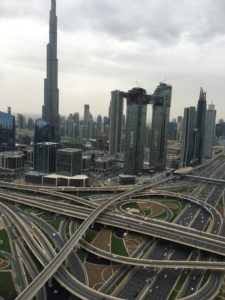 I was exploring Dubai, searching for sustainability lessons to share with students and clients who travel on study tours with Center for Leadership in Global Sustainability, and boy did I find a doozy. Dubai figured out how to turn oil into water, build one of the world’s most dynamic and striking skyscraper studded cities, and become an exemplar of sustainable development.
I was exploring Dubai, searching for sustainability lessons to share with students and clients who travel on study tours with Center for Leadership in Global Sustainability, and boy did I find a doozy. Dubai figured out how to turn oil into water, build one of the world’s most dynamic and striking skyscraper studded cities, and become an exemplar of sustainable development.
Oil was discovered in the 1960s near what was then a hot and thirsty town of under 50,000 people. The population now approaches 3 million and may exceed 5 million within 10 years. It’s no secret how it happened: wise vision, strong governance, and strategic investments. The latter is the focus of this blog: Dubai’s leaders invested limited oil revenues into technology and infrastructure that produces the water a growing city needs.
Massive desalination plants, some solar powered, now extract nearly all Dubai’s drinking water from plentiful seawater. Groundwater is still pumped for agriculture and other uses, but it can be saltier than seawater so it also can require treatment. Freshwater recharge of aquifers is increasing slightly because of regular cloudseeding to increase rain. Wastewater is treated and recycled into a vast drip-irrigation network that supports agriculture and landscaping. With all these investments in infrastructure, people living in one of the driest places on Earth now use more water per person than most anywhere else on the world, three times more than the average EU resident.
Dubai begs the question: what is sustainable development? Sustainable development’s ambiguity has always been the concept’s power and weakness: the ambiguity brings people to the table but they talk about different things. Fungibility underlies many of the debates over sustainability: it is a technical concept that confuses most of my students, whether they be undergraduates, PhDs, or business executives. But once fungibility is understood, it is easier to understand what’s really being debated when people argue over what sustainable development means for their community.
Defining fungibility requires introducing two more terms: natural and social capital. Natural capital is the rain, oil, soil, wild places, biodiversity, and other services and things nature provides humans free of charge. Social capital is humanity’s wealth, inventions, infrastructure, institutions, laws, universities, governments, medicine, science, religion, art, and everything else humans use to promote our health, safety, prosperity, and enjoyment. We harvest, mine, develop, farm, hunt, and otherwise use natural capital: some of it we consume, some of it we invest and use to build social capital.
The key to sustainable development is strategically investing enough of the proceeds from harvesting natural capital to build the social capital needed to replace the services and functions previously produced by the consumed/destroyed natural capital. It is tempting to just consume all the natural capital in ways that directly and immediately improve our material quality of life. Sustainable development, however, requires knowing how much of the revenues from natural capital to consume and how much to invest and in what to invest.
Back to Dubai. Wealth from oil (natural capital) was wisely invested, not just in a remarkable water infrastructure (social capital). It was also invested in ports, finance centers, innovation hubs, universities, solar panels, and many other engines of prosperity and sustainability. Now oil contributes a small amount to the total economy and proceeds from other investments can, if managed wisely, construct sufficient social capital to sustain development.
The catch: the seawater is becoming saltier because desalination extracts fresh water but dumps salt back in, making desalination more expensive and more difficult —there is talk of the Gulf reaching “peak salt.” That is, the natural capital of the Gulf’s (lightly salted water) is being degraded. Worse, the stable and livable climate (natural capital) is being degraded by burning the very same fossil fuels that enabled Dubai’s success. Climate change endangers all Dubai’s other investments. Drinking water, even desalinated, becomes unsafe when piped and stored at higher temperature, workers get heat stroke and die at 50 degrees C, and roads and buildings flood and sink as sea-levels rise. Keen vision, wise investments, and good governance will be needed to sustain development in Dubai, and in most other places on Earth.